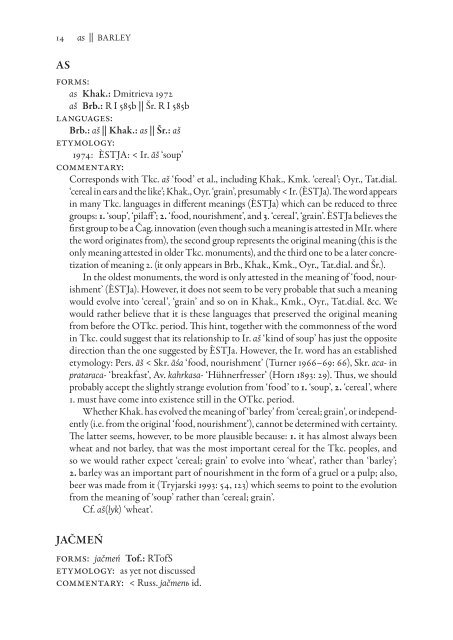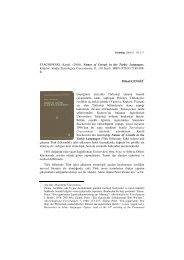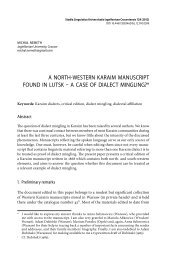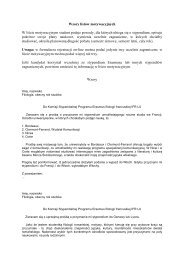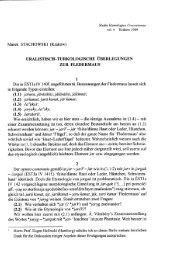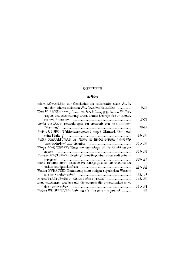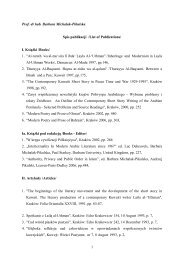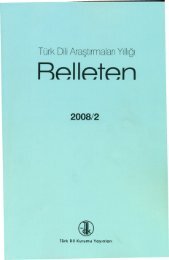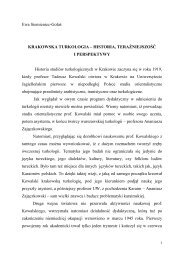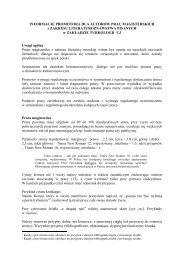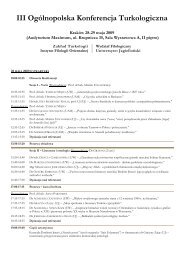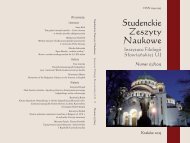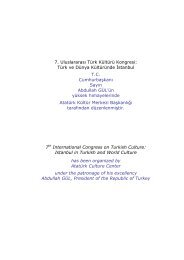Names of Cereals in the Turkic Languages - Wydział Filologiczny UJ
Names of Cereals in the Turkic Languages - Wydział Filologiczny UJ
Names of Cereals in the Turkic Languages - Wydział Filologiczny UJ
- No tags were found...
You also want an ePaper? Increase the reach of your titles
YUMPU automatically turns print PDFs into web optimized ePapers that Google loves.
14 as || Barleyasforms:as Khak.: Dmitrieva 1972aš Brb.: R I 585b || Šr. R I 585blanguages:Brb.: aš || Khak.: as || Šr.: ašetymology:1974: ÈSTJA: < Ir. āš ‘soup’commentary:Corresponds with Tkc. aš ‘food’ et al., <strong>in</strong>clud<strong>in</strong>g Khak., Kmk. ‘cereal’; Oyr., Tat.dial.‘cereal <strong>in</strong> ears and <strong>the</strong> like’; Khak., Oyr. ‘gra<strong>in</strong>’, presumably < Ir. (ÈSTJa). The word appears<strong>in</strong> many Tkc. languages <strong>in</strong> different mean<strong>in</strong>gs (ÈSTJa) which can be reduced to threegroups: 1. ‘soup’, ‘pilaff’; 2. ‘food, nourishment’, and 3. ‘cereal’, ‘gra<strong>in</strong>’. ÈSTJa believes <strong>the</strong>first group to be a Čag. <strong>in</strong>novation (even though such a mean<strong>in</strong>g is attested <strong>in</strong> MIr. where<strong>the</strong> word orig<strong>in</strong>ates from), <strong>the</strong> second group represents <strong>the</strong> orig<strong>in</strong>al mean<strong>in</strong>g (this is <strong>the</strong>only mean<strong>in</strong>g attested <strong>in</strong> older Tkc. monuments), and <strong>the</strong> third one to be a later concretization<strong>of</strong> mean<strong>in</strong>g 2. (it only appears <strong>in</strong> Brb., Khak., Kmk., Oyr., Tat.dial. and Šr.).In <strong>the</strong> oldest monuments, <strong>the</strong> word is only attested <strong>in</strong> <strong>the</strong> mean<strong>in</strong>g <strong>of</strong> ‘food, nourishment’(ÈSTJa). However, it does not seem to be very probable that such a mean<strong>in</strong>gwould evolve <strong>in</strong>to ‘cereal’, ‘gra<strong>in</strong>’ and so on <strong>in</strong> Khak., Kmk., Oyr., Tat.dial. &c. Wewould ra<strong>the</strong>r believe that it is <strong>the</strong>se languages that preserved <strong>the</strong> orig<strong>in</strong>al mean<strong>in</strong>gfrom before <strong>the</strong> OTkc. period. This h<strong>in</strong>t, toge<strong>the</strong>r with <strong>the</strong> commonness <strong>of</strong> <strong>the</strong> word<strong>in</strong> Tkc. could suggest that its relationship to Ir. aš ‘k<strong>in</strong>d <strong>of</strong> soup’ has just <strong>the</strong> oppositedirection than <strong>the</strong> one suggested by ÈSTJa. However, <strong>the</strong> Ir. word has an establishedetymology: Pers. āš < Skr. āśa ‘food, nourishment’ (Turner 1966–69: 66), Skr. aca- <strong>in</strong>prataraca- ‘breakfast’, Av. kahrkasa- ‘Hühnerfresser’ (Horn 1893: 29). Thus, we shouldprobably accept <strong>the</strong> slightly strange evolution from ‘food’ to 1. ‘soup’, 2. ‘cereal’, where1. must have come <strong>in</strong>to existence still <strong>in</strong> <strong>the</strong> OTkc. period.Whe<strong>the</strong>r Khak. has evolved <strong>the</strong> mean<strong>in</strong>g <strong>of</strong> ‘barley’ from ‘cereal; gra<strong>in</strong>’, or <strong>in</strong>dependently(i.e. from <strong>the</strong> orig<strong>in</strong>al ‘food, nourishment’), cannot be determ<strong>in</strong>ed with certa<strong>in</strong>ty.The latter seems, however, to be more plausible because: 1. it has almost always beenwheat and not barley, that was <strong>the</strong> most important cereal for <strong>the</strong> Tkc. peoples, andso we would ra<strong>the</strong>r expect ‘cereal; gra<strong>in</strong>’ to evolve <strong>in</strong>to ‘wheat’, ra<strong>the</strong>r than ‘barley’;2. barley was an important part <strong>of</strong> nourishment <strong>in</strong> <strong>the</strong> form <strong>of</strong> a gruel or a pulp; also,beer was made from it (Tryjarski 1993: 54, 123) which seems to po<strong>in</strong>t to <strong>the</strong> evolutionfrom <strong>the</strong> mean<strong>in</strong>g <strong>of</strong> ‘soup’ ra<strong>the</strong>r than ‘cereal; gra<strong>in</strong>’.Cf. aš(lyk) ‘wheat’.jačmeńforms: jačmeń T<strong>of</strong>.: RT<strong>of</strong>Setymology: as yet not discussedcommentary: < Russ. jačmenь id.


